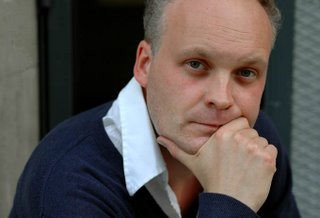 I am very glad to feature the poet, scholar and editor Patrick McGuinness (pictured here) this Friday, St. Patrick's Day (a merely happy coincidence, I assure my readers).
I am very glad to feature the poet, scholar and editor Patrick McGuinness (pictured here) this Friday, St. Patrick's Day (a merely happy coincidence, I assure my readers).McGuinness was born in 1968 in Tunisia. In 1998 he won an Eric Gregory Award for poetry from the Society of Authors and in 2001 he won the Levinson Prize from the Poetry Foundation and Poetry magazine.
His poems, translations, essays and reviews have appeared in the London Review of Books, the Times Literary Supplement, The Independent, PN Review, Poetry Wales, Leviathan, and New Writing 10.
His books include a collection of poetry, The Canals of Mars, from Carcanet, academic works such as Maurice Maeterlinck and the Making of Modern Theatre (Oxford University Press, 2000) and Symbolism, Decadence and the 'fin de siècle': French and European Perspectives (University of Exeter Press, 2000).
He has also given us editions and anthologies, such as Anthologie de la poésie symboliste et décadente (Paris: Les Belles lettres, 2001), T.E Hulme: Selected Writings (Carcanet, 1998; 2004; Routledge USA, 2004) and (a personal favourite of mine) J-K Huysmans, Against Nature (Penguin Classics, 2003).
Most recently, he edited the Collected Poems of Lynette Roberts for Carcanet (see a previous post).
He is a fellow of St Anne's College, University of Oxford, where he lectures in French. He lives in Cardiff.
Bruges
The streets reappear in the water’s backwash
of disclosure; brick by widowed brick
houses from Atlantis gaze back: mirage
or mirror image? The real and the reflected
swap dimensions; the swan signs the surface
in his careful hand, neck and neck with his ghost.
Prosperous trees count their leaves;
the canal is calm as it multiplies the dawns.
poem by Patrick McGuinnes
from The Canals of Mars (Carcanet, 2004)
Comments